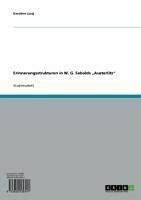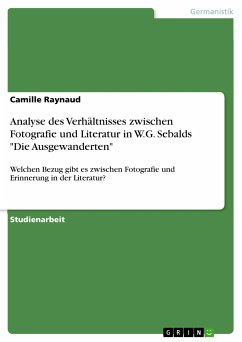Magisterarbeit aus dem Jahr 2008 im Fachbereich Germanistik - Neuere Deutsche Literatur, Note: 1.3, Universität Konstanz (Fachbereich Deutsche Literatur ), Sprache: Deutsch, Abstract: 1 Einleitung But these are the memories of an adult. Curiously enough, the events are remembered and seem to have been experienced in a way that was far beyond the normal capacity for recall in a young child of my age. It is as though this process of witnessing is of an event that happened on another level, and was not part of the mainstream of the conscious life of a little boy.1 Im dritten Kapitel von Testimony2 schlägt Dori Laub vor, den Holocaust als ein Ereignis zu betrachten, das die Bedingung der Möglichkeit von Zeugenschaft (und also Zeugenschaft selbst) zu eliminieren suchte. Dies geschah nicht nur durch die programmatische Ermordung der Zeugen der Verbrechen, sondern zuallererst durch die "inhärent nicht-assimilierbare Struktur des Erlebnisses bei den Überlebenden",3 die jegliche Zeugenschaft von vornherein ausschloss. Die schiere Anwesenheit in einem Geschehen wie dem Holocaust hob die Möglichkeit von Zeugenschaft augenblicklich auf,4 wie dies für schwere Traumen mit anschließender Amnesie allgemein gilt. Aber: "the 'not telling' of the story serves as a perpetuation of its tyranny."5 Damit sind die Schwierigkeiten des Erzählens dieser Geschichte und ihrer (gegebenenfalls) literarischen Vermittlung schon angedeutet: Es soll etwas erzählt oder geschrieben werden, das im Grunde nicht gewusst werden kann.
Dieser Download kann aus rechtlichen Gründen nur mit Rechnungsadresse in A, B, BG, CY, CZ, D, DK, EW, E, FIN, F, GR, HR, H, IRL, I, LT, L, LR, M, NL, PL, P, R, S, SLO, SK ausgeliefert werden.









